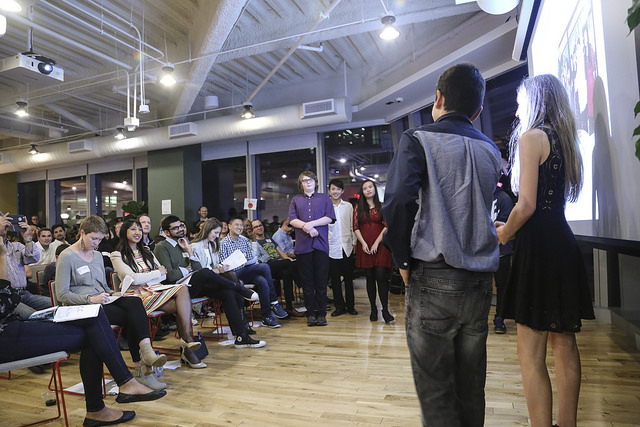
For anyone working in tech, hackathons are far from novel. They’ve been a fixture of the tech community, both locally and globally, for years – from internal company endeavors like Microsoft’s, to invite-only events like the NBA’s recent first-time foray, and lots in between.
At these events, however true or false, some might speculate that in attendance would be well-educated 20-to-30-somethings, often upwardly mobile, and even more often, predominantly male and white, where the goals and outcomes of the hackathons are being set by adult decision-makers.
Yet just last week, low-income youth of color were calling the shots. On Saturday, Nov. 5 – just a few short days before the election – more than 200 people from a wide cross-section of the community, balanced in gender and diverse in race and class, and perhaps most notably – of a wide range of ages – came together to address various challenges that often go unnoticed by the average adult.
The second annual Civic Tech Challenge – organized by Generation Citizen – was a day long “hackathon-inspired” event that brought together middle and high school youth and their college-age “Democracy Coaches” to work with teams of technologists from over two dozen different companies on issues the youth are tackling. Not your grandmother’s hackathon, to be sure…
As its core programming, Generation Citizen provides an action-based civics education program to low-income middle and high school youth. Instead of traditional (and nearly extinct) civics, which is usually textbook-based and mostly fact memorization (e.g. “What are the three branches of government?”), Generation Citizen instead helps students learn civics through taking action on a local issue that impacts students – from public transit to affordable housing, police brutality and even sex trafficking, water conservation and so much else.
At the Civic Tech Challenge — a cross-sector collaboration comes at a time in the semester when students are gearing up to approach their various targets (i.e. Influencers and Decision-Makers). What better way to make a compelling case toward their goal than to have a tech-based tool to help them along the way?
Students not only research the root causes and set a specific goal, but in the process of taking action toward achieving the goal, they engage various targets and deploy a variety of tactics. At the end of the semester, students from each class attend a science fair-style showcase and present their work to a range of community stakeholders, compete for awards, get real time feedback and more. Not only do students increase their civic knowledge and skills along the way, but perhaps most importantly, their civic motivation. Positions as judges are available here for Generation Citizen’s next event, Bay Area Civics Day on Dec. 6, which celebrates the end of the semester.
Generation Citizen offered 25 classes this semester, and has 35 more slated for next semester! Topics include a chatbot web portal that disseminates renters’ rights to a cyber-bullying app that lets students report incidents anonymously; a robust data visualization of student feedback on cafeteria options to a website that tackles gender inequality within schools.
So while there are few hackathons that can make claims of increasing civic engagement, Generation Citizen is using some of the best attributes of tech to do just that. And while you’ll rarely see one of those 20-to-30-somethings working shoulder-to-shoulder with youth at your normal hackathon, one could say the state of civic engagement (and politics at large) is far from normal these days, so any effort to bring together different segments of the community toward a common goal is a solution that no hack, however innovative, can really compete with.
More about Generation Citizen
Generation Citizen (www.generationcitizen.org) works to ensure that every student in the United States receives an effective action civics education, which provides them with the knowledge and skills necessary to participate in our democracy as active citizens.
Generation Citizen also partners with colleges to recruit volunteer “Democracy Coaches” that help deliver our civics curriculum. Through our program, students see that their voice and actions can have a very real and meaningful positive impact in the local community, develop a stronger sense of agency, and learn civic engagement through real-life hands-on community action.
The Bay Area site currently serves 1500 low-income middle and high school students throughout San Francisco, Oakland and Berkeley (along with Rhode Island, Boston, NYC and launching in Central Texas and Oklahoma City).





